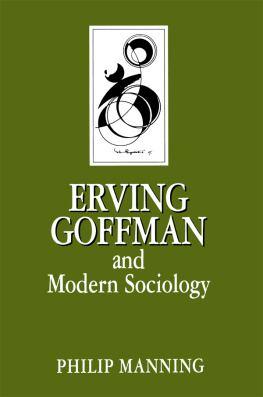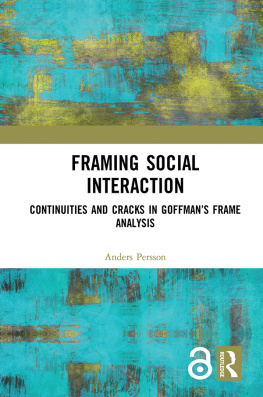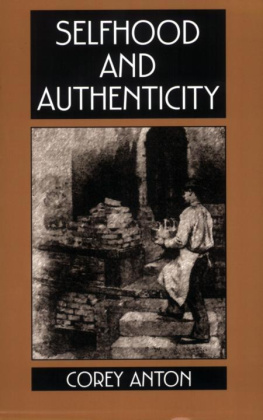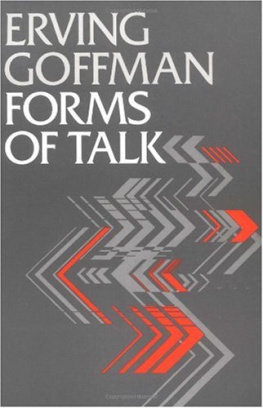Goffman Erving - Erving Goffman and Modern Sociology
Here you can read online Goffman Erving - Erving Goffman and Modern Sociology full text of the book (entire story) in english for free. Download pdf and epub, get meaning, cover and reviews about this ebook. City: Cambridge, year: 2014, publisher: Wiley;Polity Press, genre: Religion. Description of the work, (preface) as well as reviews are available. Best literature library LitArk.com created for fans of good reading and offers a wide selection of genres:
Romance novel
Science fiction
Adventure
Detective
Science
History
Home and family
Prose
Art
Politics
Computer
Non-fiction
Religion
Business
Children
Humor
Choose a favorite category and find really read worthwhile books. Enjoy immersion in the world of imagination, feel the emotions of the characters or learn something new for yourself, make an fascinating discovery.
- Book:Erving Goffman and Modern Sociology
- Author:
- Publisher:Wiley;Polity Press
- Genre:
- Year:2014
- City:Cambridge
- Rating:3 / 5
- Favourites:Add to favourites
- Your mark:
- 60
- 1
- 2
- 3
- 4
- 5
Erving Goffman and Modern Sociology: summary, description and annotation
We offer to read an annotation, description, summary or preface (depends on what the author of the book "Erving Goffman and Modern Sociology" wrote himself). If you haven't found the necessary information about the book — write in the comments, we will try to find it.
Erving Goffman and Modern Sociology — read online for free the complete book (whole text) full work
Below is the text of the book, divided by pages. System saving the place of the last page read, allows you to conveniently read the book "Erving Goffman and Modern Sociology" online for free, without having to search again every time where you left off. Put a bookmark, and you can go to the page where you finished reading at any time.
Font size:
Interval:
Bookmark:
Key Contemporary Thinkers
Published
Peter Burke, The French Historical Revolution: The Annales School, 19291989
Simon Evnine, Donald Davidson
Christopher Hookway, Quine: Language, Experience and Reality
Douglas Kellner, Jean Baudrillard: From Marxism to Post-modernism and Beyond
Chandran Kukathas & Philip Pettit, Rawls: A Theory of Justice and its Critics
Philip Manning, Erving Goffman and Modern Sociology
Michael Moriarty, Roland Barthes
Georgia Warnke, Gadamer: Hermeneutics, Tradition and Reason
Jonathan Wolff, Nozick: Property, Justice and the Minimal State
Forthcoming
Michael Best, Galbraith
Michael Caesar, Umberto Eco
James Carey, Innis and McLuhan
Eric Dunning, Norbert Elias
Jocelyn Dunphy, Paul Ricoeur
Judith Feher-Gurewich, Lacan
Andrew Gamble, Hayek and the Market Order
Graeme Gilloch, Walter Benjamin
Philip Hansen, Hannah Arendt
Adrian Hayes, Talcott Parsons and the Theory of Action
Paul Kelly, Ronald Dworkin
Lois McNay, Michel Foucault
William Outhwaite, Habermas
Simon Schaffer, Kuhn
Geoff Stokes, Popper: Politics, Epistemology and Method
Ian Whitehouse, Rorty
James Williams, Lyotard
Erving Goffman
and
Modern Sociology
Philip Manning
Polity Press
Copyright Philip Manning 1992
The right of Philip Manning to be identified as author of this work has been asserted in accordance with the Copyright, Designs and Patents Act 1988.
First published in 1992 by Polity Press in association with Blackwell Publishers
Reprinted 2005, 2007
Polity Press
65 Bridge Street
Cambridge, CB2 1UR, UK
Polity Press
350 Main Street
Malden, MA 02148, USA
All rights reserved. Except for the quotation of short passages for the purposes of criticism and review, no part of this publication may be reproduced, stored in a retrieval system, or transmitted, in any form or by any means, electronic, mechanical, photocopying, recording or otherwise, without the prior permission of the publisher.
Except in the United States of America, this book is sold subject to the condition that it shall not, by way of trade or otherwise, be lent, resold, hired out, or otherwise circulated without the publishers prior consent in any form of binding or cover other than that in which it is published and without a similar condition including this condition being imposed on the subsequent purchaser.
ISBN: 978-0-7456-0852-5
ISBN: 978-0-7456-0853-2 (pbk)
ISBN: 978-0-7456-6766-9 (eBook)
A CIP catalogue record for this book is available from the British Library.
Typeset in 11 on 13 pt Times
by Best-set Typesetter Ltd., Hong Kong
Printed and bound in Great Britain by Marston Book Services Limited, Oxford
This book is printed on acid-free paper.
For further information on Polity, visit our website: www.polity.co.uk
Various people helped with the preparation of this book. I would like to thank Irving Velody and Robin Williams from the University of Durham, Mike Emmison from the University of Queensland, Jason Ditton from Glasgow University, Doug Maynard from the University of Wisconsin-Madison, David Good and Derek Gregory from Cambridge University, and Thom Feucht, Rob Kleidman, Sarah Matthews, Bill Morgan, and Dick Stephens from Cleveland State University.
I want to thank Tony Giddens for his help throughout this project. I also profited from the extensive comments of a reviewer for Stanford University Press.
Earlier versions of parts of different chapters have appeared in journals. I would like to thank the editors and anonymous referees of these journals for their comments and the editors for permission to reuse the material: Goffmans Revisions, Philosophy of the Social Sciences Vol. 18, No. 1, 1988; Resemblances, History of the Human Sciences Vol. 2, No. 2, 1989; Ritual Talk, Sociology Vol. 23, No. 3, 1989; Goffmans Changing Use of the Dramaturgical Metaphor, Sociological Theory (Jan.Feb.), 1991.
INTRODUCTION
In this book I present a brief, but comprehensive, account of the ideas of Erving Goffman (192282), and show why these ideas are central to modern sociology. The idea that Goffman is central to sociology is mildly ironic, because he is often remembered as an outsider, a brilliant maverick, a one of a kind genius, a man who is bleakly knowing about modern urban life. From this view, he is a dispassionate observer who sees through our day-to-day performances and self-presentations. For example, Gary Marx tells us that Goffman presented himself as a detached, hard-boiled cynic, the sociologist as 1940s private eye. His was a hip, existential, cool, personal style (1984: 637). Although there is truth to this view, it does have one limitation: it plays down Goffmans commitment to the development of sociology. His acute observations about everyday life were not only meant to make us think again about our day-today behavior; they were also part of an abstract analysis of social interaction. For many years Goffman tried to develop a general theory of face-to-face interaction, a theory that could be used to interpret any social exchange, whether it took place in a bar or a boardroom. However, despite his enthusiasm for this general theory, he also remained extremely skeptical about the possibility of discovering such a general theory. It is as if he were committed to finding this theory at one moment and indifferent to it at the next.
For his supporters, it is the tension between his attempt to develop a theory of social interaction and his doubts that such a theory exists that makes his work so provoking. For his critics, this tension makes Goffman inconsistent, and his books hard to interpret. Often Goffman seems to have two contradictory voices: one voice tells of a general pattern beneath different examples of ordinary behavior, while the other emphasizes the crucial differences between examples.
Although Goffmans attempt to develop a general theory of face-to-face interaction is fascinating in its own right, it also raises a question. Is it possible for sociologists to develop a general sociological theory, a theory both of institutions and social interaction? In his introduction to Frame Analysis, Goffman wrote about the limits of his own work while supporting the ambitious projects pursued by other sociologists:
I make no claim to be talking about the core matters of sociology social organization and social structure. I am not addressing the structure of social life but the structure of experience individuals have at any moment of their social lives. I personally hold society to be first in every way and any individuals current involvements to be second. (1974: 13)
In the final chapter I look at one attempt to develop a general theory of the structure of social life using Goffmans ideas. This is the structuration theory developed by Anthony Giddens. This theory thrusts Goffman to the center of contemporary debates about the relationship between structure and agency. In the later chapters in this book I suggest that in order to theorize agency it is necessary to understand the use of rules in everyday life. I suggest that Goffman offers an incomplete account of rule-following, and that his ideas have to be supplemented with insights from ethnomethodology. I do not see Goffman as a precursor to ethnomethodology; rather, I believe that a combination of his ideas with theirs provides an important resource for mainstream sociology. I also believe that Giddenss theory is the best available vehicle for their delivery.
Font size:
Interval:
Bookmark:
Similar books «Erving Goffman and Modern Sociology»
Look at similar books to Erving Goffman and Modern Sociology. We have selected literature similar in name and meaning in the hope of providing readers with more options to find new, interesting, not yet read works.
Discussion, reviews of the book Erving Goffman and Modern Sociology and just readers' own opinions. Leave your comments, write what you think about the work, its meaning or the main characters. Specify what exactly you liked and what you didn't like, and why you think so.









